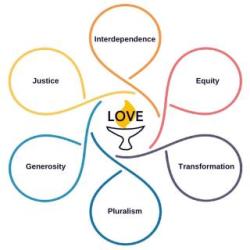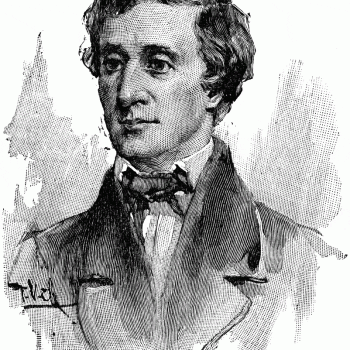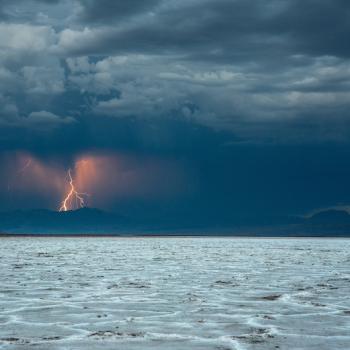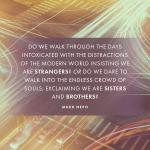
To what extent can humans know and understand God? a reader asks. In answering, I start at the beginning. These 9 ways are not prioritized, but they do move from the first to the second half of life and the thread of incarnation runs through them. Everything we experience of God is embodied, en-fleshed. Even our contemplative reverberations occur in the cells our spirits inhabit on this Earth. This reality, this fact of human existence, is appreciated by all traditions in various ways. But Christianity centers incarnation in a way that I appreciate.
- Parental love. If we are so fortunate, we start knowing and understanding God as newborns, when loved and mirrored well by our mothers and fathers. From the moments we enter this world and throughout our childhoods, the self-giving, grace-filled, attentive love of healthy parents may be the closest we get to encountering divine-infused love. In this way, such love gives us “eyes to see” God and prepares us for one-on-one encounters with the divine. Human, parental love is always—even in the best of circumstances—imperfect and flawed; but at times, it can be revelatory.
- Nature. Nature allows us to know and understand God (this is mentioned numerous times in scripture). This is not only because nature is “the work of God’s hands” but because the natural world is filled with God and is the only way we can see God. We know the transcendent only by way of the material. This is how we were made. Many of my first experiences of God happened along creek beds, amid choruses of leaf-wind, in river water, and in the hundred different ways I experienced the centering beauty of nature.
- Falling in love. Youthful falling in love is a twisted dichotomy of narcissistic infatuation/fear and true love. Insofar as we experience the latter and can see our loves in their God-like beauty and wonder and magnificence, we touch the divine, growing in understanding and knowledge of God. It could be that only the eyes of real love can see the God-like nature of another—the acute love-vision of parent-like and non-platonic love, but also the deep relational love we sometimes have for animals. When we are graced with such seeing, we apprehend how creatures are made in God’s image and manifest God in their best moments. While youthful falling in love may be our earliest experience of this, the experience distills and deepens as we grow older and appreciate others less for what we get from them and love them more for their own sake. One of my favorite definitions of love comes from M. Scott Peck who describes love as giving oneself for the spiritual growth of another. Giving and relating in this way is a powerful conduit of God-knowledge.
- Suffering. Few life experiences bring so close the compassion of God as suffering the pain of loss. Experiencing loss attunes us to the losses and suffering of others. There are other ways to learn empathy (fiction reading is especially effective), but personal suffering and grief may be the most immediate and potent. Few things reveal the heart of God as immediately as empathy and compassion born of suffering.
- Community knowledge or tradition. Religious or spiritual tradition is only one leg of a three-legged stool but it’s an important one (the three legs being: reason/experience; works of inspiration by others [scripture]; and tradition [this three-legs model was articulated by 16th century Anglican theologian Richard Hooker]). We need the time-honored knowledge of a tradition if only to provide a way out of univocal echo-chambers which can be distorting and disorienting. The understandings of the wisdom traditions don’t encapsulate God, but in their luminous moments, different wisdom traditions or spiritual paths point to God beautifully—each in their own way, and point to something larger than ourselves.

{Photo by Maksim Chernyshev for Scopio; humans can know God}
- Vocation/Creativity. When we are doing the work we’re made for, when we’re in the zone, we incarnate God. We make God en-fleshed and manifest in this world for others to see. But at these moments, we can also draw closer to God ourselves, perhaps able to understand and know God uniquely because of our unique gifts. A poet knows parts of God that are different from those understood well by a veterinarian. And a grave digger knows and understands different aspects of God than a chef or a quantum physicist.
- Spiritual friendship. This is like the healthy parent/child connection. We can come to know God’s love and grace and embrace by being mirrored well in friendship. We can come to understand God’s love and grace and embrace of others by walking beside friends who share their God-encounters and who challenge us to love them as God does—however imperfectly. Spiritual friendships allow us to be honest and vulnerable about our feelings, just as we can express our vulnerabilities to God.
- Contemplation. Mystics like St. Teresa of Avila write of contemplation as the most direct way of knowing and understanding God—as a summit of spiritual experience and relationship to the divine. Not because of anything concrete that it reveals, but almost because of in-concrete-ness and emptiness. This was the profound teaching of Meister Eckhart, a German contemplative of the 14th century, who famously said, “There is nothing so much like God in all the universe as silence.” Contemplation and contemplative prayer are a primary way we release the forms we shove God into in order to touch the mysterious silence that is God. According to the mystics, contemplation fills us with love—love being its measure.
- Service. Service to those in pain and in need. Adam Bucko calls service to those in pain: “touching the sacred wound of God.” This may be the deepest, surest way we know and understand God, though it is the one we resist the most. We do almost anything to avoid touching the wound at the heart of God. I sometimes notice the sacred wound of God while traveling from Point A to Point B—when I cannot avoid it. In my car, I might pass a dead deer by the side of the road; or when walking a city street, I might pass a cluster of houseless people who appear struggling and cold and uncomfortable. In such cases, if I’m willing, I might feel air rush out of my lungs and my heart drop. I’ve started to see this experience as a kind of prayer—and a way of glimpsing, in the most infinitesimal way, God’s pain. As we respond to such experiences by working to bring help, healing, and justice into realms of suffering, we become a possible conduit of God’s restorative work, God’s response to brokenness. Such acts of service lead to knowing and understanding God by allowing the divine to use our very hearts and hands and feet. When we can transcend our resistance and step into acts of service, we step into the restorative stream that is God.
Wren, winner of a 2022 Independent Publishers Award Bronze Medal
Winner of the 2022 Independent Publisher Awards Bronze Medal for Regional Fiction; Finalist for the 2022 National Indie Excellence Awards. (2021) Paperback publication of Wren , a novel. “Insightful novel tackles questions of parenthood, marriage, and friendship with finesse and empathy … with striking descriptions of Oregon topography.” —Kirkus Reviews (2018) Audiobook publication of Wren.



















